Reformation Day
Reformation Day is a Protestant Christian religious holiday celebrated on 31 October, alongside All Hallows' Eve (Halloween) during the triduum of Allhallowtide, in remembrance of the onset of the Reformation.
.jpg.webp)
| Part of a series on the |
| Reformation |
|---|
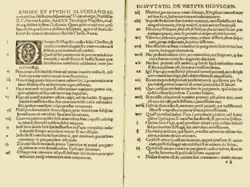 |
| Protestantism |
According to Philip Melanchthon, 31 October 1517 was the day German monk Martin Luther nailed his Ninety-five Theses on the door of the All Saints' Church in Wittenberg, Electorate of Saxony in the Holy Roman Empire. Historians and other experts on the subject argue that Luther may have chosen All Hallows' Eve on purpose to get the attention of common people, although that has never been proven. Available data suggest that 31 October was the day when Luther sent his work to Albert of Brandenburg, the Archbishop of Mainz. This has been verified; nowadays, it is regarded as the start of the Reformation alongside the unconfirmed (Melanchthon appears to be the only source for that) nailing of the Ninety-five Theses/grievances to All Saints' Church's door on the same date.
The holiday is a significant one for both Lutheran and Calvinist Churches, although other Protestant communities also tend to commemorate the day. The Roman Catholic Church recognized it only recently, and often sends its official representatives in ecumenical spirit to various commemoration events held by Protestants. It is lawfully and officially recognized in some states of Germany and sovereign countries of Slovenia and Chile. In addition, countries like Switzerland and Austria provide specifics in laws pertaining to Protestant churches, while not officially proclaiming it a nationwide holiday.
History
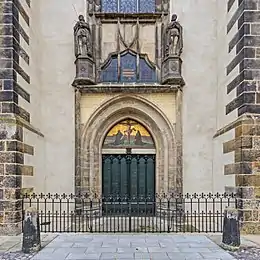
In 1516–17, Johann Tetzel, a Dominican friar and papal commissioner for indulgences, was sent to Germany to raise money to rebuild St Peter's Basilica in Rome.[1]
On 31 October 1517, Martin Luther wrote to Albrecht, Archbishop of Mainz and Magdeburg, protesting against the sale of indulgences. He enclosed in his letter a copy of his "Disputation of Martin Luther on the Power and Efficacy of Indulgences", which came to be known as the Ninety-five Theses.[2] Hans Hillerbrand writes that Luther had no intention of confronting the church, but saw his disputation as a scholarly objection to church practices, and the tone of the writing is accordingly "searching, rather than doctrinaire."[3] Hillerbrand writes that there is nevertheless an undercurrent of challenge in several of the theses, particularly in Thesis 86, which asks: "Why does the pope, whose wealth today is greater than the wealth of the richest Crassus, build the basilica of St. Peter with the money of poor believers rather than with his own money?"[3]
Luther objected to a saying attributed to Johann Tetzel that "As soon as the coin in the coffer rings, the soul from purgatory [also attested as 'into heaven'] springs."[4] He insisted that, since forgiveness was God's alone to grant, those who claimed that indulgences absolved buyers from all punishments and granted them salvation were in error. Christians, he said, must not slacken in following Christ on account of such false assurances.
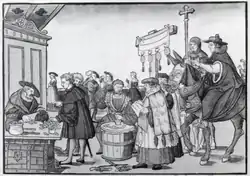
According to Philipp Melanchthon, writing in 1546, Luther "wrote theses on indulgences and posted them on the church of All Saints on 31 October 1517", an event now seen as sparking the Reformation.[5] Some scholars have questioned Melanchthon's account, since he did not move to Wittenberg until a year later and no contemporaneous evidence exists for Luther's posting of the theses.[6] Others counter that such evidence is unnecessary because it was the custom at Wittenberg university to advertise a disputation by posting theses on the door of All Saints' Church, also known as "Castle Church".[7]
The Ninety-five Theses were quickly translated from Latin into German, printed, and widely copied, making the controversy one of the first in history to be aided by the printing press.[8] Within two weeks, copies of the theses had spread throughout Germany; within two months throughout Europe.
Luther's writings circulated widely, reaching France, England, and Italy as early as 1519. Students thronged to Wittenberg to hear Luther speak. He published a short commentary on Galatians and his Work on the Psalms. This early part of Luther's career was one of his most creative and productive.[9] Three of his best-known works were published in 1520: To the Christian Nobility of the German Nation, On the Babylonian Captivity of the Church, and On the Freedom of a Christian.
The parish order for the New Church in Regensburg states that the Reformation of the city is to be observed the first Sunday after 15 October, every year. This document may be from 1567, however the dating is uncertain. The 1569 church order in Pomerania states that the Reformation was to be observed on St. Martin's Day, which falls on 11 November. The hundredth anniversary of the Reformation, celebrated throughout the Protestant areas of Germany, was observed from 31 October to 1 November 1617, but a standard annual observance began much later, sometime after the two hundredth anniversary commemoration in 1717. The first annual observance was instituted by John George II, Elector of Saxony in his domains in 1667.
Significance
It is celebrated among various Protestants, especially by Lutheran and Reformed Churches. Due to ecumenical movements, some other Christian groups now tend to acknowledge or co-participate in church services celebrating Reformation Day. That includes the Roman Catholic Church, as well as various Protestant denominations that are neither Lutheran nor Reformed, i.e. lack a direct connection to religious events of the 16th century Europe.
In the United States churches often transfer the holiday, so that it falls on the Sunday (called Reformation Sunday) on or before 31 October, with All Saints' Day moved to the Sunday on or after 1 November.
Roman Catholic attitudes
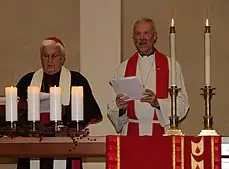
On 31 October 1999, the Lutheran World Federation and the Pontifical Council for Promoting Christian Unity signed the Joint Declaration on the Doctrine of Justification,[10] regarding a resolution on some points of doctrinal disagreement between mainline Lutheran Churches and the Catholic Church[10] (See also Criticism of Protestantism). The World Methodist Council formally recognized the Declaration in 2006.[11][12]
In 2013, the Joint International Commission between representatives of the Lutheran World Federation and the Catholic Church published a report entitled From Conflict to Communion, anticipating the forthcoming Lutheran-Catholic Common Commemoration of the Reformation in 2017, which noted that "in 2017, Lutheran and Catholic Christians will commemorate together the 500th anniversary of the beginning of the Reformation".[13] The "common commemoration" was a year-long remembrance concluded on Reformation Day 2017.[14]
Anniversaries
been destroyed; in memory of this we
both drink and are comforted at this hour.
— Martin Luther to Nikolaus von Amsdorf
on 1 November 1527[15]
In Germany, with the Reformation only ending more or less around 1648, and continued Catholic–Protestant animosity all over Europe well into the early 20th century, most of the following Reformation anniversaries were tainted by a degree of anti-Catholicism and nationalism. In 1617, the celebration of faith concentrated on Lutheran orthodoxy, while in 1717, the event was more focused on the liberation from the papal rule. Luther was celebrated as God's elected tool against the slavery of the new Roman Babylon. In 1817, the victory over Napoleon influenced the celebrations and led to the anniversary's national orientation: Luther became the German hero and the ideal role model for the bourgeoisie; he was depicted time and again in festive parades and popular prints. The "German Luther" also drew wide attention in 1917 during the First World War when nationalist themes were still recurring; at the same time, serious research of Luther's theology gained increasing importance.
When the Lutheran areas of West Germany celebrated the Reformation anniversary in 1967, 450 years after the posting of the theses, the event took place during an "ice age" in the relationship between the state and the Church in East Germany. This became clear through the attempt to secularise the Reformation with the concept of the "early bourgeois revolution" and through the pointed marginalisation of events organised by the Church, for example by means of holding celebrations of the October Revolution at exactly the same time. In the Federal Republic of Germany there were only local celebrations, organised by the churches of the respective states. A central church event in Wittenberg on 31 October 1967 was held in order to keep up at least a pretence of an all-German Evangelical Church.
50th anniversary
According to some sources, Reformation Day has been commemorated since 1567. Exact dates for the holiday varied until after the two hundredth celebration in 1717 when 31 October became the official date of celebration in Germany and later expanded internationally.[16][17]
Centenary
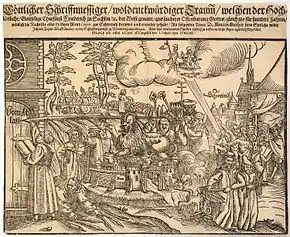
In 1617, the celebration of faith concentrated on Lutheran orthodoxy.[18] In early 1617, the Lutheran duke and elector John George I of Saxony received a politically delicate dispatch. The University of Wittenberg asked for permission to celebrate the memory of its former lecturer Martin Luther. The duke agreed and made the commemoration obligatory for all of Electoral Saxony. The worship services and sermons were, however, all prewritten and prescribed in detail and provided as a recommendation to other Protestant regional rulers as well. They did not want any trouble with the Catholics.[19] In the end, the Reformation was celebrated in 1617 in nearly all of the Protestant territories of the Holy Roman Empire, and members of the Protestant Union and others following its lead all celebrated together on the first Sunday in November. As Wolfgang Flügel, an expert for Reformation jubilees and a researcher with the Society for Reformation History of the University of Halle-Wittenberg explains: "Competition and crises were decisive in the realization and content of the 1617 celebrations." The historian Heinz Schilling speaks of "confrontation for the sake of preserving one's own identity".
150th anniversary
In 1667, John George II, Elector of Saxony made it an official holiday for the first time in his domains. After celebrations in 1717 and 1817, it became more and more popular across Europe.[20]
200th anniversary
After the Thirty Years' War ended in 1648, it made a horrendous impact, with observations in 1717 being largely anti-Catholic.
300th anniversary
The 1817 anniversary was largely nationalist in outlook, being impacted by some of the most important events in human history: the French Revolution, the Napoleonic Wars, and political and territorial rearranging of Europe with the Congress of Vienna.
400th anniversary
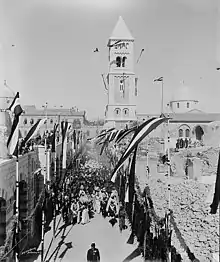
The 1917 anniversary was held amidst the First World War. The theme of "German Luther" was rather muted, marked by Germanophobia throughout the Anglo-Saxon world. In Germany, the anniversary was celebrated with nationalist elements.
499th anniversary
On Reformation Day in 2016, Pope Francis of the Catholic Church travelled to Sweden (where the Lutheran Church is the national Church) to commemorate the Reformation at Lund Cathedral, which serves as the seat for the Lutheran Bishop of Lund.[21][22] An official press release from the Holy See stated:[23]
The Lutheran World Federation (LWF) and Roman Catholic Church joint event will highlight the 50 years of continuous ecumenical dialogue between Catholics and Lutherans and the joint gifts of this collaboration. The Catholic-Lutheran commemoration of 500 years of the Reformation is structured around the themes of thanksgiving, repentance and commitment to common witness. The aim is to express the gifts of the Reformation and ask forgiveness for division perpetuated by Christians from the two traditions.[23]
An ecumenical service was presided over by Bishop Munib Younan, the president of the Lutheran World Federation; Martin Junge, the General Secretary of the LWF; and Pope Francis, the leader of the Catholic Church.[24] Representatives from the Anglican Communion, Baptist World Alliance, Eastern Orthodox Church, and Salvation Army also participated in the predominantly Lutheran and Roman Catholic event.[25] Pope Francis, in a joint statement with Bishop Munib Younan, stated that "With gratitude we acknowledge that the Reformation helped give a greater centrality to sacred Scripture in the Church's life".[26]
500th anniversary
unstoppable and changed the world forever.[27]
— Angela Merkel, Chancellor of Germany
in Wittenberg on 31 October 2017
31 October 2017 was an official holiday in all of Germany.[28] As a legal basis, German states which usually do not celebrate Reformation Day annually passed legislation or made regulations. These states are Baden-Württemberg,[29] Bavaria,[30] Berlin,[31] Bremen,[32] Hamburg,[33] Hesse,[34] Lower Saxony,[35] North Rhine-Westphalia,[36] Rhineland-Palatinate,[37] Saarland,[38] and Schleswig-Holstein.[39]
In the United States, the Evangelical Lutheran Church in America hosted an event to commemorate the Reformation in the Washington National Cathedral in Washington, D.C. on Sunday, 29 October.[40] The Wisconsin Evangelical Lutheran Synod had various special Reformation services in their various districts to celebrate the 500th anniversary of the Reformation.[41][42]
In Germany, representatives from Lower Saxony, Schleswig-Holstein, Hamburg and Bremen concluded a decision had to be made by state parliaments on whether to make Reformation Day a permanent official holiday in these respective states.[43] Proclamations about this were passed in Hamburg and Schleswig-Holstein, while Lower Saxony and Bremen still await their own votes on the matter.
In 2017, the press of the Vatican released a stamp to commemorate the 500th anniversary of the Reformation; the stamp depicts Luther and Melanchton kneeling before a crucified Jesus.[44][45]
Legal status
It is a civic holiday in the German states of Brandenburg, Hamburg, Bremen, Lower Saxony, Mecklenburg-Vorpommern, Saxony, Saxony-Anhalt, Schleswig-Holstein and Thuringia. Slovenia celebrates it as well due to the profound contribution of the Reformation to that nation's cultural development, although Slovenes are mainly Roman Catholics. With the increasing influence of Protestantism in Latin America (particularly newer groups such as various Evangelical Protestants, Pentecostals or Charismatics),[46] it has been declared a national holiday in Chile in 2009.[47]
Lutheran church
Within the Lutheran church, Reformation Day is considered a lesser festival, and is officially referred to as The Festival of the Reformation. Until the 20th century, most Lutheran churches celebrated Reformation Day on 31 October, regardless of which day of the week it occurred. Today, most Lutheran churches transfer the festival, so that it falls on the Sunday (called Reformation Sunday) on or before 31 October and transfer All Saints' Day to the Sunday on or after 1 November.
The liturgical colour of the day is red, which represents the Holy Spirit and the Martyrs of the Christian Church. Luther's hymn, "Ein feste Burg ist unser Gott" ("A Mighty Fortress is our God"), a paraphrase of Psalm 46, is traditionally sung on this day. It is also traditional in some Lutheran schools for schoolchildren to hold Reformation Day plays or pageants that re-enact scenes from the life of Martin Luther. The fact that Reformation Day coincides with Halloween is not mere coincidence. Halloween, being the Eve of All Saints' Day, might have been an entirely appropriate day for Luther to post his Ninety-five Theses against indulgences since the castle church would be open on All Saints' Day specifically for people to view a large collection of relics. The viewing of these relics was said to promise a reduction in time in purgatory similar to that of the purchase of an indulgence. That Martin Luther intended his Ninety-five Theses to persuade the common people, however, is extremely unlikely, since they were written in Latin, a language which the common people did not understand.
Reformation Day (Reformationsfest) was celebrated in Leipzig in Johann Sebastian Bach's time with a service, for which he composed church cantatas, including Gott der Herr ist Sonn und Schild, BWV 79 and Ein feste Burg ist unser Gott, BWV 80.
Reformed church
Although not shaped by Luther's doctrine, Calvinist churches throughout the world do not regard the Reformation Day as less important, and celebrate it in a similar manner to Lutherans. The nailing of the Ninety-five Theses sparked the discussion about Catholic beliefs and practices of the day. Reformed theology first emerged in 1516 with Huldrych Zwingli in Switzerland who decided to participate in this European-wide discussion after seeing Luther's postulates; all this would not have happened without the events of 31 October 1517. French lawyer John Calvin joined the theological conversation in 1536 with publication of his Institutes of the Christian Religion.
Other Protestant churches
Other Protestant denominations differ in their celebration of this holiday from the Lutheran and Reformed way of honoring the events, to a complete lack of observance.
In 2016, Anglicans from the Diocese of Chile of the Anglican Church of South America participated in the March for Jesus on Reformation Day as a celebration of their Protestant heritage.[50] Many Anglican/Episcopal churches hold Reformation Day services in observance of the holiday.[51]
The United Methodist Church offers a theological reason for its observance of Reformation Day, stating that:[52]
Our roots are deep in the Anglican tradition: Both John and Charles Wesley were priests in the Church of England. There are a number of reasons we should observe the day. The themes of the Reformation remain the great themes and principles of our own faith today. The great schism that occurred in the church remains with us. Our fractured denominations have entered into dialogue and cooperative activities that have brought us closer together. Today we may observe Reformation Day with a sense of moving toward unity and community. It is an opportunity to repent of the sins and excesses of the past and to celebrate our common faith, even if we still cannot celebrate a common ritual and sacrament. Reformation today can represent healing of old wounds as, together, we all work to build and strengthen Christ's church and love one another as Christ has loved us.[52]
Alongside Reformation Day, many Protestant Churches observe All Hallows' Eve on 31 October, the vigil of All Saints' Day.
See also
- Buß- und Bettag, a unique Protestant holiday observed in Saxony and, to some degree, also in Bavaria
References
- "Johann Tetzel," Encyclopædia Britannica, 2007: "Tetzel's experiences as a preacher of indulgences, especially between 1503 and 1510, led to his appointment as general commissioner by Albrecht, archbishop of Mainz, who, deeply in debt to pay for a large accumulation of benefices, had to contribute a considerable sum toward the rebuilding of St. Peter's Basilica in Rome. Albrecht obtained permission from Pope Leo X to conduct the sale of a special plenary indulgence (i.e., remission of the temporal punishment of sin), half of the proceeds of which Albrecht was to claim to pay the fees of his benefices. In effect, Tetzel became a salesman whose product was to cause a scandal in Germany that evolved into the greatest crisis (the Reformation) in the history of the Western church."
- Ramani, Madhvi (24 October 2017). "How Martin Luther's ideas lasted 500 years". www.bbc.com. Retrieved 22 September 2019.
- Hillerbrand, Hans J. "Martin Luther: Indulgences and salvation," Encyclopædia Britannica, 2007.
- Bainton, Roland. Here I Stand: a Life of Martin Luther. New York: Penguin, 1995, 60; Brecht, Martin. Martin Luther. tr. James L. Schaaf, Philadelphia: Fortress Press, 1985–93, 1:182; Kittelson, James. Luther The Reformer. Minneapolis: Augsburg Fortress Publishing House, 1986), 104.
- Brecht, 1:200–201.
- Iserloh, Erwin. The Theses Were Not Posted. Toronto: Saunders of Toronto, Ltd., 1966; Derek Wilson, Out of the Storm: The Life and Legacy of Martin Luther, London: Hutchinson, 2007, ISBN 978-0-09-180001-7, 96.
- Junghans, Helmer. "Luther's Wittenberg," in McKim, Donald K. (ed.) The Cambridge Companion to Martin Luther. New York: Cambridge University Press, 2003, 26.
- Brecht, Martin. Martin Luther. tr. James L. Schaaf, Philadelphia: Fortress Press, 1985–93, 1:204–205.
- Spitz, Lewis W. The Renaissance and Reformation Movements, St. Louis: Concordia Publishing House, 1987, 338.
- Lutheran World Federation; Pontifical Council for Promoting Christian Unity. "Joint Declaration on the Doctrine of Justification". Vatican.va. Retrieved 6 August 2018.
- LaBarr, Joan G. (20 July 2006). "World Methodists approve further ecumenical dialogue". United Methodist Church. Archived from the original on 21 July 2006.
- Wooden, Cindy (24 July 2006). "Methodists adopt Catholic-Lutheran declaration on justification". Catholic News Service. Archived from the original on 25 July 2006. Retrieved 4 July 2017.
- From Conflict to Communion: Lutheran-Catholic Common Commemoration of the Reformation in 2017, accessed 31 October 2017
- Joint Statement by the Lutheran World Federation and the Pontifical Council for Promoting Christian Unity on the conclusion of the year of the common commemoration of the Reformation, 31 October 2017, 31 October 2017, accessed 2 November 2017
- Krey, Philip D. W. (9 August 2017). Reformation Observances: 1517-2017. Wipf and Stock Publishers. p. 2. ISBN 978-1-5326-1656-3.
- "What is Reformation Day?". gotquestions.org. Retrieved 8 April 2018.
- Cichanowicz, Lily. "A Brief History Of Germany's Reformation Day". theculturetrip.com. Retrieved 8 April 2018.
- "'We drink in remembrance of this' - Reformation anniversaries over the course of the centuries". Luther2017. Archived from the original on 7 November 2017. Retrieved 8 April 2018.
- "Perspectives 2017: Writings on the Reformation" (PDF). Evangelische Kirche in Deutschland.
- "Stichwort: Reformationstag". www.luther2017.de. Retrieved 1 January 2021.
- MacKinnon, Angus (25 January 2016). "500 years after reformation, Pope knocks on Lutherans' door". Yahoo News. Retrieved 22 February 2017.
Pope Francis will celebrate the 500th anniversary of the Reformation by attending an ecumenical service in Sweden as a guest of the Lutheran Church, the Vatican said Monday. In a highly symbolic act of reconciliation that would even recently have been unthinkable for a Catholic pontiff, Francis will visit the Swedish city of Lund on 31 October for a commemoration jointly organised by his own inter-faith agency and the Lutheran World Federation (LWF).
- Sherwood, Harriet (31 October 2016). "Catholics and Lutherans sign joint declaration 'accepting common path'". The Guardian. ISSN 0261-3077. Retrieved 8 March 2020.
- "Preparations to commemorate 500 years since the Reformation". Holy See Press Office. 1 June 2016. Retrieved 22 February 2017.
- "Pope Francis to travel to Sweden for joint Reformation commemoration". Vatican Radio. 26 January 2016. Retrieved 22 February 2017.
- Agnew, Paddy (25 January 2016). "Pope to attend ceremony marking 500 years since Reformation". The Irish Times. Retrieved 22 February 2017.
- Anderson, Christina (31 October 2016). "Pope Francis, in Sweden, Urges Catholic-Lutheran Reconciliation". The New York Times. Retrieved 22 February 2017.
- "Luther hat die Welt für immer verändert". www.ekd.de. Retrieved 8 April 2018.
- "Reformationstag – 2017 einmalig bundesweiter Feiertag?". Stuttgarter Zeitung (in German). 29 October 2013.
- Gesetz über die Sonntage und Feiertage (Feiertagsgesetz – FTG) ArbZ 1.3.1
- Gesetz zur Änderung des Feiertagsgesetzes vom 12. April 2016 (GVBl. S. 50)
- Abgeordnetenhaus Berlin, Plenarprotokoll, 25. Juni 2015
- Gesetz zur Änderung des Gesetzes über die Sonn- und Feiertage, Drucksache des Landtags vom 7. Mai 2013
- Fünfte Verordnung zum Feiertagsgesetz (Verordnung über den Reformationstag 2017) vom 30. April 2013
- Verordnung zur Bestimmung des Reformationstages 2017 zum gesetzlichen Feiertag vom 16. Oktober 2013
- "VORIS NFeiertagsG – Landesnorm Niedersachsen – Gesamtausgabe – Niedersächsisches Gesetz über die Feiertage (NFeiertagsG) in der Fassung vom 7. März 1995 - gültig ab: 01.01.1995". www.voris.niedersachsen.de. Retrieved 8 April 2018.
- Gesetz über die Bestimmung des 31. Oktober 2017 als 500. Jahrestag der Reformation zum Feiertag in Nordrhein-Westfalen vom 25. Juni 2015 (GV. NRW. S. 496)
- Rheinland-Pfalz, Staatskanzlei. "Zusätzlicher Feiertag 2017". www.rlp.de. Retrieved 8 April 2018.
- Verordnung zur Erklärung des 500. Reformationsjubiläums am 31. Oktober 2017 zum Feiertag vom 18. Juni 2014, Amtsbl. S. 283,
- Landesverordnung über den Reformationstag 2017 vom 24. November 2014
- "Lutheran Reformation 500 Service". Washington National Cathedral. Retrieved 8 April 2018.
- "Reformation 500". Cross of Christ Evangelical Lutheran Church. Retrieved 31 October 2020.
- "REFORMATION 500". WELS Northern Wisconsin District. Retrieved 31 October 2020.
- "Reformationstag: Norddeutschland soll neuen Feiertag bekommen". 1 February 2018. Retrieved 8 April 2018 – via Spiegel Online.
- "Vatican releases postage stamps on Reformation, St. Francis of Sales". Vatican News. 23 November 2017. Retrieved 8 March 2020.
- Crux Staff (26 November 2017). "Vatican issues stamp featuring Martin Luther for Reformation anniversary". Crux. Retrieved 8 March 2020.
- "Look who's celebrating Reformation Day today". Reuters. Retrieved 8 April 2018.
- "Reformation Day in Chile". Episcopal Café. 1 December 2010. Archived from the original on 1 December 2010. Retrieved 1 January 2021.
- ""An Eternal Gospel to Proclaim" (Revelation 14:6-7)". St. Matthew Lutheran Church. 26 October 2019. Retrieved 1 January 2021.
- Hartung, Bruce (14 October 2014). "Reformation Day • Revelation 14:6–7 • October 26, 2014". Concordia Theology. Retrieved 1 January 2021.
- Drake, Gavin (18 October 2016). "Chilean Anglicans to March for Jesus on Reformation Day". Anglican Communion News Service. Retrieved 22 February 2017.
- Jansma, Henry (25 September 2017). "Reformation Day Service – 6:00PM". All Souls Anglican Church. Retrieved 31 October 2018.
All Souls Anglican adjourns its normal 4:00 pm on October 29th to join our fellow reformed churches at 6:00 pm to remember God’s gracious providence displayed during the Protestant Reformation of the 15th and 16th Centuries at the 500th anniversary of the Reformation.
- McIntyre, Dean. "Reformation Day: What, Why, and Resources for Worship". Discipleship Ministries. Retrieved 22 February 2017.
External links
- Martin Luther – 95 Theses – 500th anniversary Official Site

